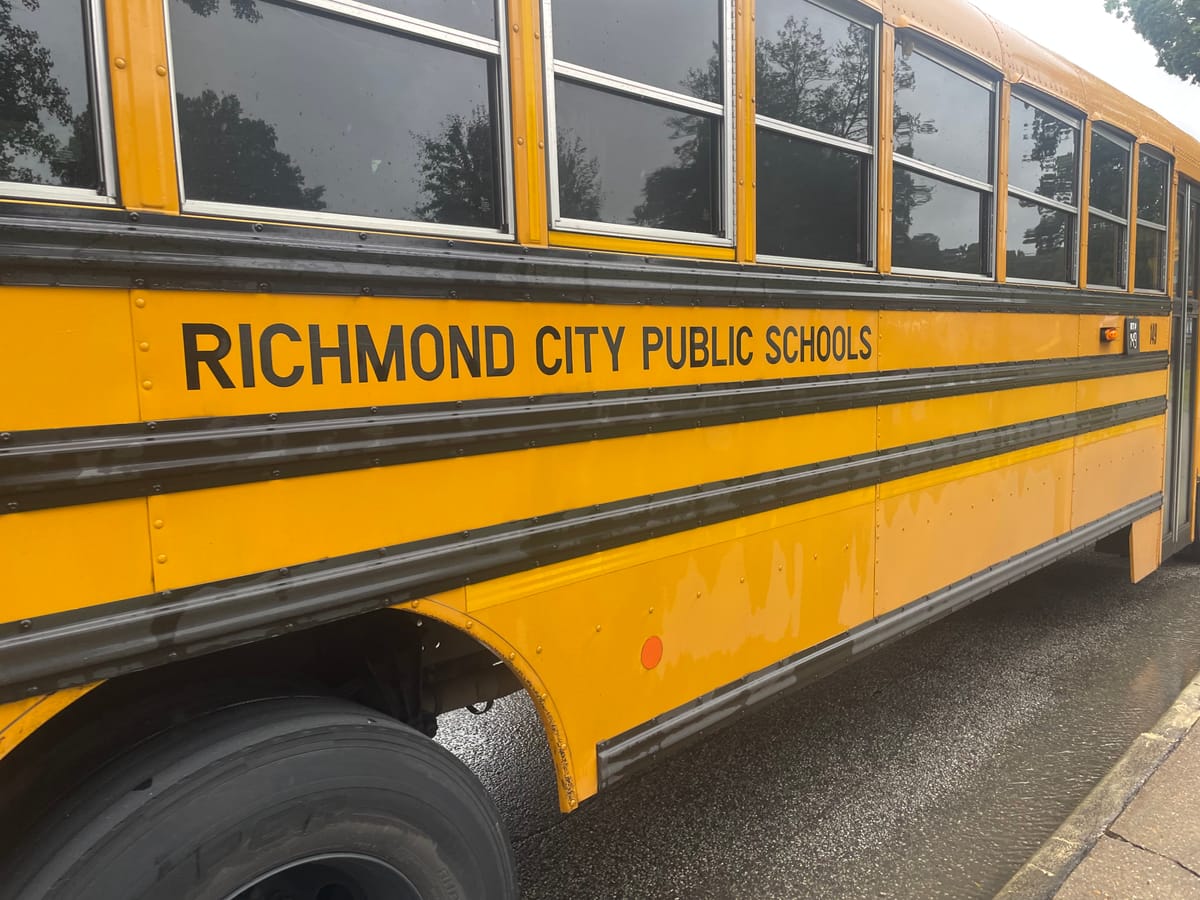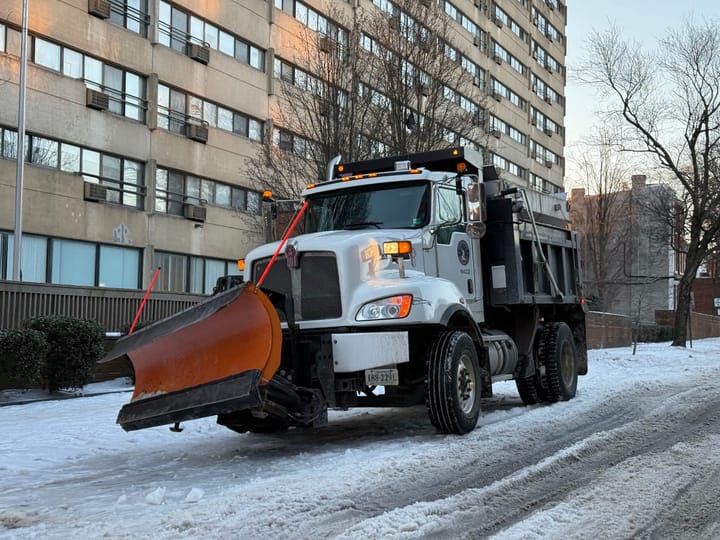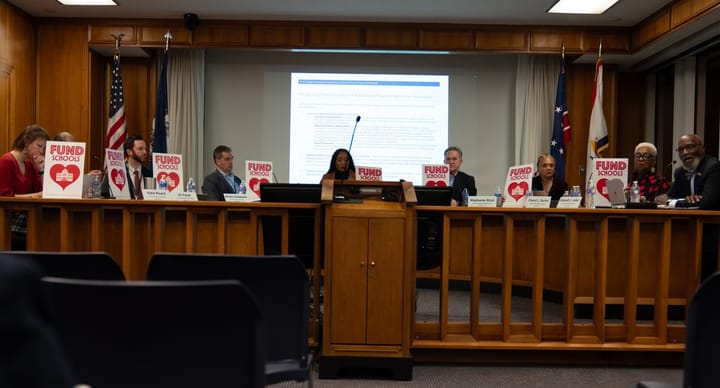
RPS, bus drivers clash over alleged strike and firing of five employees
Tensions between Richmond Public Schools and the union that represents its bus drivers are at an all-time high after the division fired five drivers earlier this month over what it says was an unlawful strike that led to the cancellation of afterschool activities for thousands of students.
Chris Hollins, the assistant business manager with LiUNA Local 804, on Sunday said the union plans to file a lawsuit in Richmond Circuit Court over the firings, as well as a federal lawsuit against RPS for infringing on the workers’ freedom of speech and freedom of assembly rights.
The fight stems from the alleged April 8 callout of a number of bus drivers scheduled to perform transportation runs for afterschool activities.
While RPS has said it cannot provide details on personnel issues, an April 21 memo from Superintendent Jason Kamras to School Board members obtained through the Virginia Freedom of Information Act, as well as an April 29 email Kamras wrote to a parent about the incident, provide some insight.
In the memo, Kamras says nine drivers notified their supervisor that they wouldn’t be able to complete their afterschool routes on April 8. Of those, two were scheduled to be absent the whole day, and two others “changed their minds before after-school activities were canceled.”
The remaining five “provided verbal notification that they would not complete their after-school bus routes in order to attend the School Board meeting before activities were canceled at approximately 2:45 pm,” he wrote.
While large portions of the memo have been redacted, it includes a section of Virginia code that says any local or state employee “who, in concert with two or more other such employees, for the purpose of obstructing, impeding or suspending any activity or operation of his employing agency or any other governmental agency, strikes or willfully refuses to perform the duties of his employment shall, by such action, be deemed to have terminated his employment.”
Virginia, which only began allowing local government workers to collectively bargain in 2021, is not alone in prohibiting public sector employees from striking. Several dozen states explicitly prohibit the practice.
Kamras also cited the state law in an email to a parent in which he said “an investigation by the RPS Department of Employee and Labor Relations found that several employees called out that afternoon to protest RPS’s position in the ongoing negotiations over their collective bargaining agreement.”
“We welcome — encourage, in fact — our employees to make their voices heard. But not at the expense of students and families,” he wrote. “Doing so not only falls squarely within the prohibited conduct set out in Va. Code 40.1-55(A), but it also violates our most solemn obligation: to serve and protect students above all else.”
LiUNA Local 804, however, has called the characterization of the callouts as a strike “a falsehood” and “something management made up to provoke fear into transportation workers for exercising their freedom of speech and association.” It is calling for the reinstatement of the workers, which it has labeled “The RPS Five,” and is circulating an online petition and a GoFundMe in their support.
In an interview, Hollins said that while the union had encouraged members to come out to the School Board meeting to air their views over an ongoing dispute over how drivers should be paid for afterschool runs, it had not urged them to participate in any kind of organized callouts.
“I do know it is not permissible to strike,” said Hollins. “That is not a practice that we practice, and we don’t encourage workers to do that.”
Hollins also denied that all five drivers had called out at the last minute and said several had been in the process of completing a transportation run when RPS cancelled afterschool activities. He insisted that none believed they had done anything wrong and were surprised at being notified of their termination.
“These workers take pride in their job everyday,” he said. “It would be outlandish to think they would formulate a strike and compromise the integrity of their jobs.”
Long-running disagreement on overtime pay
For more than a year, Richmond schools and LiUNA have been butting heads over how drivers should be paid for afterschool activity runs, an issue that has left contract negotiations being conducted through the collective bargaining process at an impasse.
Last spring, an RPS audit found that many bus drivers were being paid two hours of overtime for afterschool runs even if they had not worked a full 40 hours that week or if the run had taken less than two hours. The auditor estimated RPS paid bus drivers $1.8 million in overtime in fiscal year 2024.
A March 2024 memo from then-Chief Operating Officer Dana Fox ordered that overtime could only be paid once a driver had worked 40 hours and “any field trips, after-school activities, and other assignments will be paid only for the time worked (for example: if an after-school run took 53 minutes, then the overtime pay is only for 53 minutes). There are no flat rates for additional runs.”
According to the audit, “the memo was not received well” by either the drivers or LiUNA, and protests were filed with the division and the School Board.
Drivers have argued that paying for afterschool runs in two-hour blocks rather than based on the actual time spent is a longstanding practice in the district that makes it worth it for drivers to sign up for the runs.
“If we drivers can’t keep the past practice, I guarantee you that no drivers will do these programs,” Darryl Williams, one of the drivers who was later fired, said at the April 8 meeting.
In flyers LiUNA has put out urging drivers to come out to School Board meetings to comment on the issue, the union has said that without the two-hour pay blocks, “many drivers will be forced to take a pay cut when covering voluntary activity runs. That means fewer drivers will be willing or able to take those runs — leading to last-minute cancellations, scheduling issues, and increased pressure on the remaining staff.”
LiUNA has also insisted that some of the audit’s findings were incorrect and contends rising driver costs are due to the division’s shift to an eight-hour schedule rather than a six-hour one and increased hiring.
In particular, union business manager Keon Shim has disputed the division’s finding that the average take-home salary for bus drivers, including regular and overtime wages, in fiscal year 2024 was $85,347 — more than double the average from fiscal year 2019. At the April 8 meeting, Shim said that figure should be $30,000 lower.
In his April 29 email, Kamras defended the school division’s stance, saying that “the prior practice of paying drivers two hours of overtime regardless of how long a trip was — even if it was just 30 minutes, for example — was not financially responsible of the Division and not equitable for other employees who are paid overtime only for the time they actually work.”
The inability of RPS and LiUNA to reach an agreement on afterschool pay has caused contract negotiations to stall. The two sides are preparing to go before a panel to resolve the issue, following the collective bargaining procedures the division has put in place.
“We’re confident that we will prevail in that panel,” said Shim April 8.
Contact Reporter Sarah Vogelsong at svogelsong@richmonder.org






